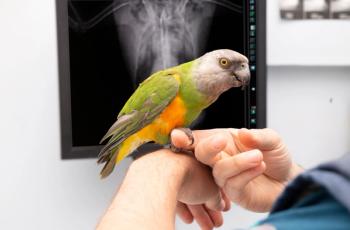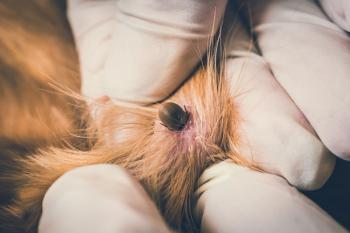
Equine herpesvirus poses threat to horses in multiple states
The highly contagious virus has been linked to a recent rodeo event, with known cases diagnosed in horses from Texas and Oklahoma.
Horses in multiple states have reportedly been diagnosed with equine herpesvirus (EHV-1) infection. Although the infectious disease is not typically deadly, it can manifest in neurologic, respiratory, or reproductive forms and can be life-threatening. Severe cases of the virus’s neurologic form, equine herpesvirus myeloencephalopathy (EHM), can be potentially fatal to the infected horse, and EHV-1 can cause abortion in pregnant mares.1,2
EHV-1 is spread through contact with infected nasal discharge and aerosol droplets between horses, as well as contaminated surfaces such as stalls, feed, tack, and vehicles. Humans can also indirectly transmit infection through contaminated hands, clothing, and equipment.1,3
Multiple cases of the highly contagious virus have been traced to the Women’s Professional Rodeo Association World Finals (WPRA) and Elite Barrel Race, held November 5-9, 2025, in Waco, Texas. Diagnostics showed 2 horses in Oklahoma, and at least 3 in Texas, were found positive for EHV-1 after traveling to this WPRA event. The 3 Texas horses are quarantined at the Louisiana State University School of Veterinary Medicine (LSU Vet Med) Veterinary Teaching Hospital in Baton Rouge.1,2
“Quarantining and reducing exposure is vital because the virus spreads easily and can transmit from horse to horse before any clinical signs appear,” Jared Janke, DVM, clinical associate professor of equine internal medicine at the Texas A&M College of Veterinary Medicine and Biological Sciences, said in a news release.3 “Preventing the movement of exposed horses helps cut off main transmission routes.”
The extent of the outbreak is not yet known.2 However, it has caused the remainder of the Barrel Futurities of America World Championship, which was scheduled for November 17-22, 2025, at Lazy E Arena in Guthrie, Oklahoma, to be canceled. Furthermore, a horse with EHV-1 was stalled on the Lazy E Arena grounds after testing positive for the virus, according to a local news report.3,4
Clinical signs of EHV-1 infection include fever, nasal discharge, enlarged lymph nodes, lethargy, and late-term abortion that can occur up to 2 months after a mare is infected, according to LSU Vet Med. Signs of EHM include an inability to stand, incoordination, urine dribbling, high fever, and decreased sensation in the tail and perineal area.1,3
“Owners that suspect a horse has been exposed should contact their veterinarian and quarantine the horse and any horses that have been exposed to that horse,” Rose Baker, BVMS, DACVIM (LAIM), associate professor of equine medicine at LSU Vet Med, said in a news release.1 “Your veterinarian can submit samples to LSU diagnostics to determine if a horse is shedding EHV-1 into the environment.”
During a 2- to 10-day EHV-1 incubation period, horses can shed the virus before developing clinical signs.2 In cases of EHM, the incubation period may be longer.3 “Any signs of fever, along with hind limb loss of coordination, urine dribbling, or weak tail tone, should prompt an owner to isolate the horse, stop the movement of any animals in contact, and reach out to their veterinarian immediately,” Janke said.3 “Your veterinarian will help ensure that the proper diagnostic tests are performed and will notify their state’s animal health official of the ongoing situation.”
Horses with EHV-1 can be treated for the virus with anti-inflammatory medications and supportive care, as well as antiviral therapies in certain cases. Vaccines can help protect horses against the respiratory and reproductive forms of the virus, but there is no vaccine available to prevent the neurologic form, according to LSU Vet Med.1
References
- LSU Vet Med treating three Texas horses quarantined for confirmed equine herpesvirus-1. News release. Louisiana State University School of Veterinary Medicine. November 19, 2025. Accessed November 21, 2025.
https://www.lsu.edu/vetmed/news/2025/equine_herpesvirus.php - Barlow L. Barrel Futurities of America suspends Oklahoma event due to EHM positives. News release. American Association of Equine Practitioners. November 19, 2025. Accessed November 21, 2025.
https://aaep.org/post/barrel-futurities-of-america-suspends-oklahoma-event-due-to-ehm-positive/ - Stopping the spread of equine herpesvirus. News release. Texas A&M College of Veterinary Medicine and Biomedical Sciences. November 21, 2025.
- Sharfman A. OK Dept of Agriculture confirms two cases of highly contagious virus affecting horses. KTUL. November 19, 2025. Updated November 20, 2025. Accessed November 21, 2025.
https://ktul.com/news/local/possible-exposure-of-equine-herpesvirus-leads-to-lazy-e-arena-event-cancellation-highly-contagious-virus-horses-oklahoma-state-veterinarian-ehv-1-rhinopneumonitis-virus-strain-symptoms-barrel-futurities-of-america
Newsletter
From exam room tips to practice management insights, get trusted veterinary news delivered straight to your inbox—subscribe to dvm360.




